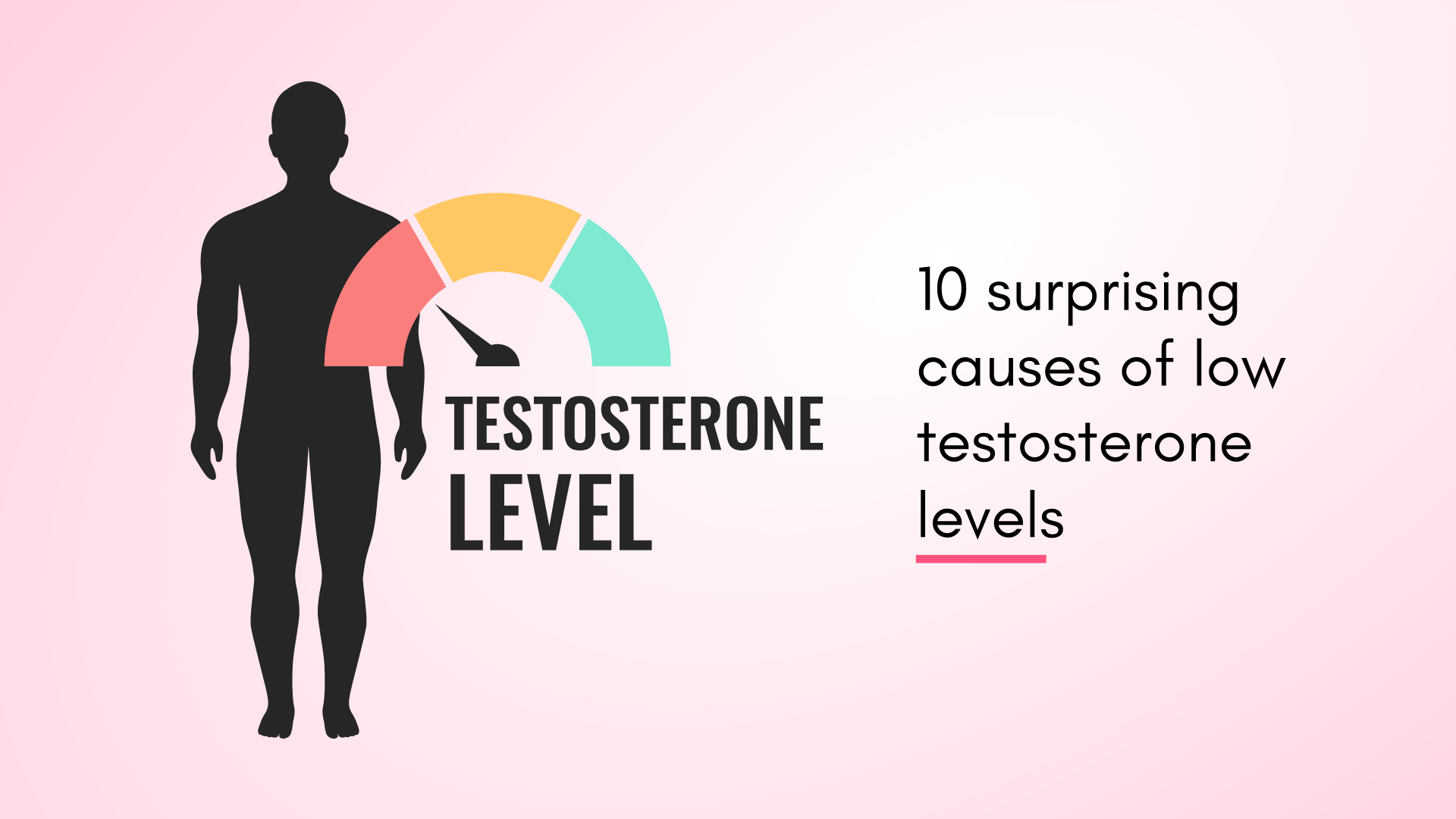Reviewed By: Dr. P. Grishma, fertility specialist at Ferty9 Fertility Clinic, Kukatpally, Hyderabad
Testosterone levels reduce with age and are also affected by medical conditions. Understanding the various causes of low testosterone plays a pivotal role in effective diagnosis and treatment. Let’s explore some surprising factors.
What Does Testosterone mean?
Testosterone is a hormone produced by the ovaries and testicles in both men and women, though levels are much lower in females. It plays a crucial role in developing men’s physical characteristics, such as facial and body hair, a deeper voice, muscle mass, and reproductive health. Similarly, testosterone influences libido, bone density, and muscle strength in women.
Also Read: The Impact Of Age On Fertility: When To Consider Seeking Assistance
Impact of Physical Activity on Testosterone Levels
Physical activity significantly influences testosterone levels. Resistance training, for example, can help counteract low testosterone by boosting muscle mass and hormone production. Additionally, regular aerobic exercise has been shown to maintain overall hormonal balance, improve cardiovascular health, and reduce stress levels, all of which contribute to healthier testosterone levels. Conversely, overtraining or excessive physical stress can negatively impact testosterone production, highlighting the importance of a balanced exercise regimen.
Related Read: Effective Pelvic Exercises for Preventing Premature Ejaculation
Poor Sleep Quality
Poor sleep quality is a major factor in reduced testosterone levels. Testosterone levels rise during deep sleep, so sleep deprivation can lead to lower hormone levels. Men with low testosterone who also suffer from insomnia may experience increased levels of the stress hormone cortisol, which further disrupts sleep cycles.
Stress and Hormonal Balance
Chronic stress is another cause of low testosterone. Elevated cortisol levels from stress can suppress the hypothalamic-pituitary-gonadal (HPG) axis, leading to decreased testosterone production.
Related Read: Can stress cause infertility?
Nutritional Deficiencies and Poor Diet
A poor diet can lead to nutritional deficiencies that affect testosterone levels. To prevent low testosterone, medical professionals recommend consuming zinc-rich foods (pumpkin seeds, lentils, chickpeas), vitamin D, healthy fats (avocados, olive oil, almonds, walnuts, chia seeds), and vitamin B6 (potatoes and bananas).
Prescription Medicine Causes Low Testosterone
Studies and research have concluded that a wide range of medications are the reason for low testosterone in men. Medications, including statins, antidepressants, chemotherapeutics, opioids, antifungals, and other hypertension-related medications, can cause low testosterone levels, impacting hormone production in men.
Impact of Alcohol on Hormone Regulation
Regular alcohol consumption can disrupt body functions and interfere with hormone regulation, including testosterone. Alcohol can impair the hormonal response, leading to lower testosterone levels. Acute alcohol consumption disrupts the hypothalamus and pituitary gland, impairing testosterone release.
Obesity and Excess Body Fat
Obesity is closely linked to low testosterone levels. Excess body fat leads to higher conversion rates of testosterone into estrogen, the female sex hormone. This imbalance results in reduced testosterone levels, further exacerbating weight gain and hormonal issues. Consult a healthcare provider or a fertility specialist to explore personalized solutions. Remember, you’re not alone on this journey, and seeking support is essential.
Related Read: Do overeating, obesity, stress & anxiety impact fertility?
Natural Testosterone Decline with Aging
The puberty phase of boys shoots up testosterone production with a surge in the GnRH and LH. It gets the maximum production at the age of 17 and remains high for the next two or three decades. It declines after the age of 40 in some men by approximately 1% every year, and the percentage goes to 30% by the age of 70.
Testosterone levels (ng/dL) in healthy men are as follows according to age-
| Age | Total testosterone | Free testosterone | Bioavailable testosterone |
|---|---|---|---|
| 40–49 | 252–916 | 5.3–26.3 | 101–499 |
| 50–59 | 215–878 | 4.2–22.2 | 80–420 |
| 60–69 | 196–859 | 3.7–18.9 | 69–356 |
| 70–79 | 156–819 | 2.2–14.7 | 41–279 |
Injury to the testicles
Testicular rupture is one of the causes of low testosterone levels, and it adversely impacts the testicles. It is a severe condition when the testicles get a forceful hit or blow, and sometimes conditions even get worse when the testicles get crushed against the pubic bone. This further leads to bleeding to leak into the scrotum.
Genetic causes
Certain genetic disorders can lead to low testosterone levels. Conditions such as Klinefelter syndrome, Kallmann syndrome, Prader-Willi syndrome, and myotonic dystrophy can adversely affect testosterone production and utilization in the body.
Conclusion
If you’re experiencing symptoms of low testosterone and are seeking assistance to start a family, it’s crucial to consult with medical specialists who understand the intricacies of infertility. At Ferty9, we specialize in treating couples facing fertility challenges, including those related to low testosterone levels in men. Our dedicated wing, AndroMax, focuses exclusively on male infertility, providing comprehensive care tailored to help you achieve your dream of parenthood.
Visit Our Clinic:
Fertility Clinic in Hyderabad
Fertility Clinic in Visakhapatnam
Fertility Clinic in Vijayawada
Fertility Clinic in Karimnagar
Fertility Clinic in Warangal
Fertility Clinic in Rajahmundry
Fertility Clinic in Tirupati
Fertility Clinic in Kurnool



